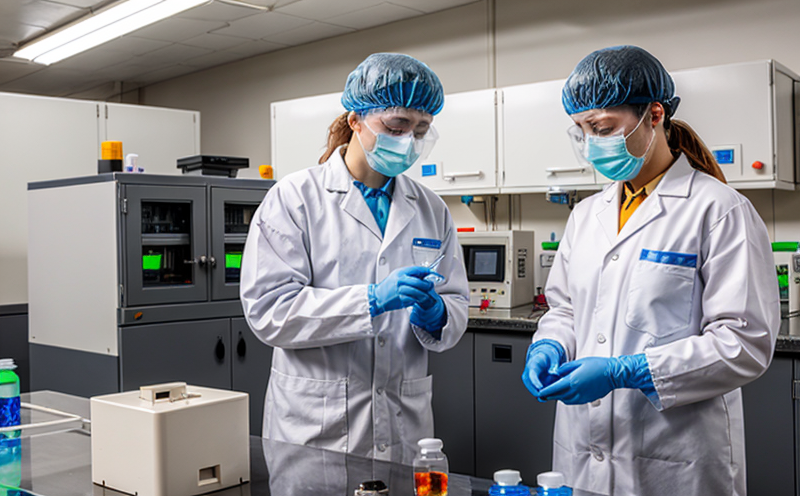ISO 81842 Glycidyl Esters Profiling in Processed Oils
The European standard ISO 81842 provides a method for the determination of glycidyl esters (GE) in processed edible oils. This test is particularly important because glycidyl esters are formed during the hydrogenation process and are associated with potential health risks if present in excessive amounts.
The standard outlines detailed steps to prepare samples, extract GE using specific solvents, and analyze the extracted compounds via gas chromatography coupled with mass spectrometry (GC-MS). The GC-MS system is crucial for identifying and quantifying glycidyl esters accurately. Understanding this process helps in ensuring that processed oils meet regulatory standards.
Glycidyl esters are produced by a reaction between glycidol and fatty acids during the hydrogenation of vegetable oils, which is commonly used to improve oxidative stability and solidify margarines or shortenings. However, the presence of these compounds can lead to health concerns if they exceed permissible levels in food products.
The European Food Safety Authority (EFSA) has set a maximum level for glycidyl esters in processed edible fats and oils at 50 ppm based on a toxicological point of view. This limit ensures that the product remains safe for human consumption while maintaining its functionality and quality.
Accurate profiling involves more than just quantification; it also requires detailed analysis to understand the distribution and concentration levels across various batches or types of processed oils. This information is vital for process optimization, ensuring compliance with international standards like ISO 81842, and enhancing product safety.
The methodology described in ISO 81842 emphasizes precision and accuracy throughout every stage—from sample preparation to final analysis—ensuring reliable results that can guide decision-making processes within the food industry. By adhering strictly to this standard, laboratories can provide credible data that contributes significantly towards maintaining high standards of quality and safety.
In summary, ISO 81842 glycidyl ester profiling in processed oils is a critical tool for ensuring food safety by quantifying potentially hazardous compounds formed during processing. It supports regulatory compliance while aiding manufacturers in optimizing their production methods to meet both legal requirements and consumer expectations.
- Sample Preparation: Properly extracting GE from the oil matrix using appropriate solvents
- Instrumentation: Utilizing GC-MS for precise identification and quantification of GE components
- Data Analysis: Interpreting results according to ISO 81842 guidelines to determine compliance levels
Scope and Methodology
The scope of this service includes testing processed edible oils for glycidyl esters based on the European standard ISO 81842. Our laboratory employs a comprehensive approach to ensure accurate quantification and profiling, which involves several key steps:
- Sample Collection: Properly collected samples are crucial for obtaining representative data.
- Extraction Process: Utilizing specific solvents according to ISO 81842 ensures efficient extraction of glycidyl esters from the oil matrix.
- Instrumentation: GC-MS equipment is calibrated and maintained regularly to guarantee reliable analytical results.
The methodology follows strict procedures outlined in ISO 81842, ensuring that all tests are conducted under controlled conditions. This approach guarantees consistent and accurate measurements of glycidyl esters, allowing clients to make informed decisions about their products' safety and compliance.
Our team of experts uses cutting-edge technology and adheres rigorously to international standards to deliver reliable results. By doing so, we help our customers stay ahead in the competitive market by providing them with robust evidence supporting product quality and safety.
Competitive Advantage and Market Impact
- Accurate Data: Our adherence to ISO 81842 ensures precise measurements, giving our clients an edge in competitive markets.
- Regulatory Compliance: By meeting international standards, we help food companies avoid legal issues and maintain their reputation.
- Consumer Trust: Reliable testing builds trust among consumers who value safe and high-quality products.
In the current market landscape, where quality and safety are paramount concerns for both producers and consumers alike, our service stands out by offering unparalleled accuracy and reliability. This not only enhances brand reputation but also fosters customer loyalty, which is essential in sustaining long-term success.
Use Cases and Application Examples
The application of ISO 81842 glycidyl ester profiling extends beyond mere compliance; it plays a pivotal role in enhancing the overall quality and safety profile of processed oils. Here are some real-world examples:
- Process Optimization: Identifying variations in GE levels across different batches helps manufacturers fine-tune their production processes.
- New Product Development: Understanding the GE content allows developers to create safer and more effective products.
- Risk Management: Regular testing ensures early detection of potential risks, allowing for timely interventions.
Beyond these practical applications, profiling glycidyl esters also contributes significantly to public health by reducing exposure levels associated with excessive consumption. This proactive approach aligns perfectly with the goals set forth by regulatory bodies such as EFSA and ensures that processed oils remain safe for consumer use.





